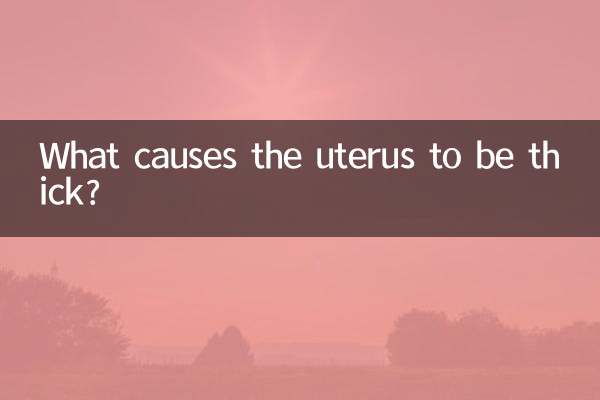Title: What causes uterine thickening? Explain symptoms, diagnosis and treatment
Uterine thickening (endometrium thickening) is one of the common gynecological problems in women and can be caused by a variety of reasons, including hormonal imbalance, inflammation, or tumors. This article will combine the hot topics and hot content on the Internet in the past 10 days to provide you with a detailed analysis of the causes, symptoms and countermeasures of uterine thickening.
1. Common causes of uterine thickening

Uterine thickening usually refers to abnormal proliferation of the endometrium, which may be caused by:
| Reason | Specific instructions | Related symptoms |
|---|---|---|
| Hormone imbalance | Too much estrogen or not enough progesterone | Irregular menstruation, prolonged menstruation |
| Polycystic ovary syndrome (PCOS) | Abnormal hormone secretion causes ovulation disorders | Obesity, hirsutism, acne |
| endometrial polyps | localized endometrial hyperplasia | abnormal uterine bleeding |
| endometrial cancer | Malignant hyperplasia (need to be vigilant) | Postmenopausal bleeding, abdominal pain |
| chronic inflammation | If endometrial inflammation occurs repeatedly | Pelvic pain, abnormal leucorrhea |
2. Recent hot topics of discussion
According to network data analysis in the past 10 days, the following topics have become hot topics of concern:
| topic | Discussion popularity | Main points of dispute |
|---|---|---|
| Risks of hormone replacement therapy | high | Does it increase the risk of endometrial cancer? |
| Conditioning effect of traditional Chinese medicine | in | Comparison with traditional Western medicine treatment |
| Rising incidence among young women | high | Correlation with stress and staying up late |
3. Typical symptoms and diagnostic methods
Common symptoms of uterine thickening include: increased menstrual flow, non-menstrual bleeding, prolonged menstruation, etc. If the following situations occur, you need to seek medical treatment promptly:
| Check items | Check method | diagnostic value |
|---|---|---|
| Ultrasound examination | Transvaginal or abdominal B-ultrasound | Preliminary measurement of intimal thickness |
| hysteroscopy | Endoscopic direct inspection | Direct observation of intimal morphology |
| Pathological biopsy | Take endometrial tissue for testing | Diagnose benign and malignant |
4. Treatment Plans and Prevention Suggestions
Treatment plans need to be formulated based on the cause:
| treatment type | Applicable situations | Specific measures |
|---|---|---|
| drug treatment | Caused by hormonal imbalance | Progestins, oral contraceptives |
| surgical treatment | polyps or cancer | Hysteroscopy, total hysterectomy |
| Traditional Chinese Medicine Conditioning | functional thickening | Traditional Chinese medicine for promoting blood circulation and removing blood stasis |
5. Health Tips
1. Regular gynecological examination (especially for women over 35 years old, ultrasound is recommended once a year)
2. Control your weight. It is recommended to keep BMI between 18.5-23.9
3. Regulate stress and avoid staying up late for long periods of time
4. If abnormal bleeding lasts for more than 3 months, you must seek medical treatment.
Summary:Uterine thickening may be a physiological change or may indicate disease. With standardized examinations and individualized treatment, most patients have a good prognosis. Recently, hot discussions on the Internet have emphasized the concern about the incidence rate among young people, and it is recommended that women increase their health awareness and detect abnormal symptoms in time.

check the details

check the details